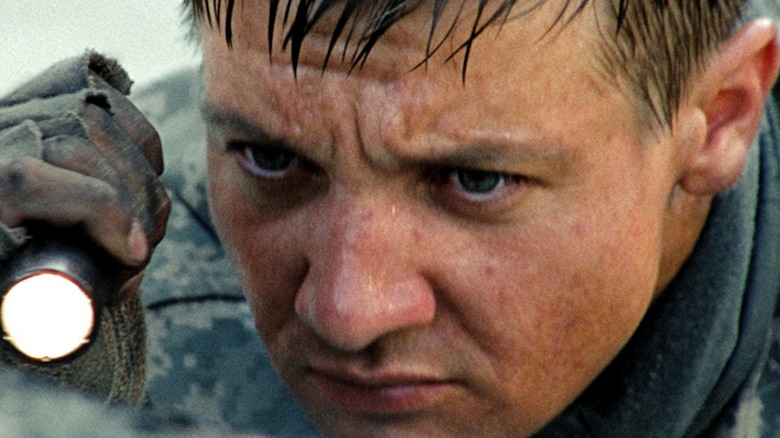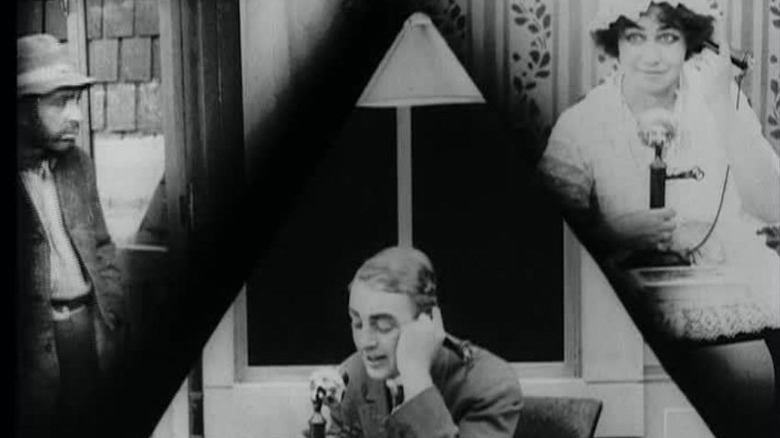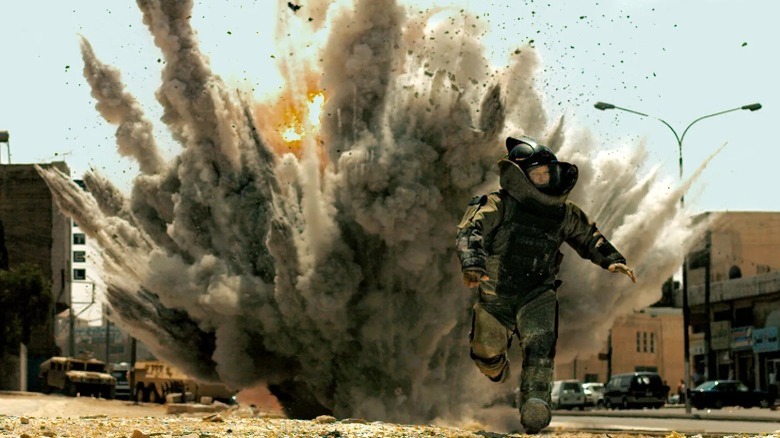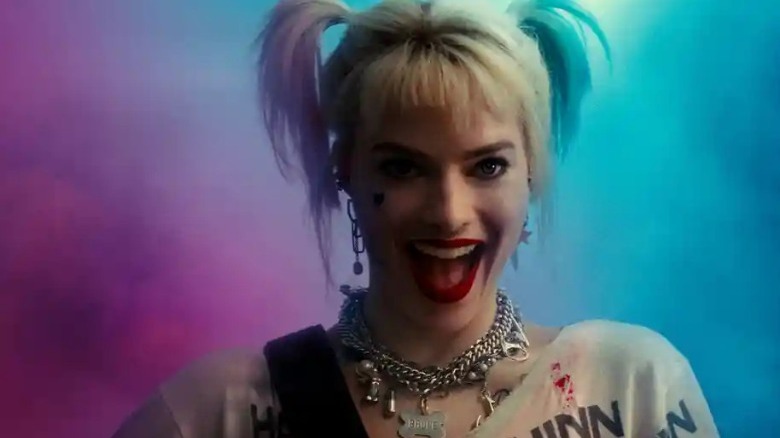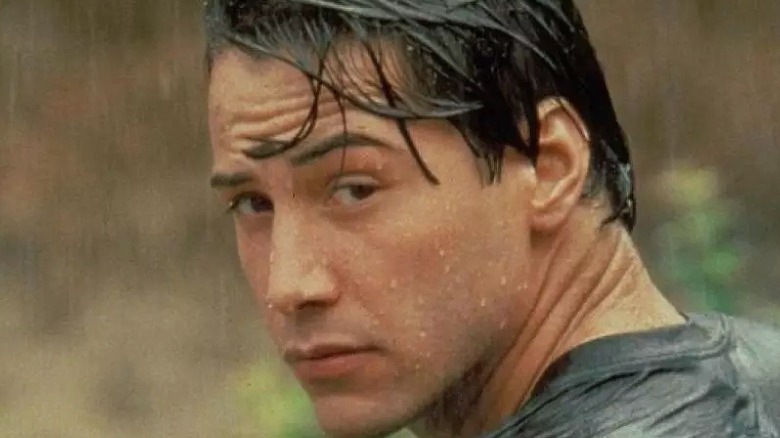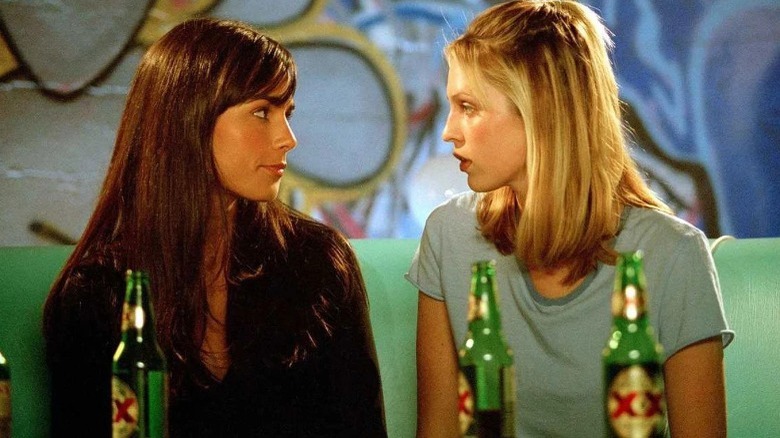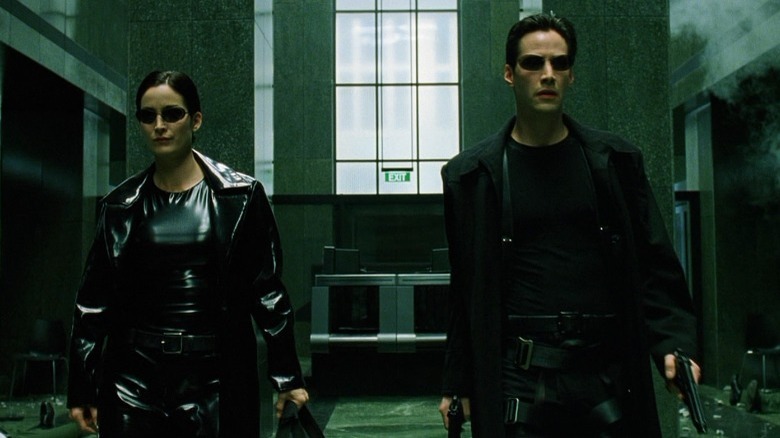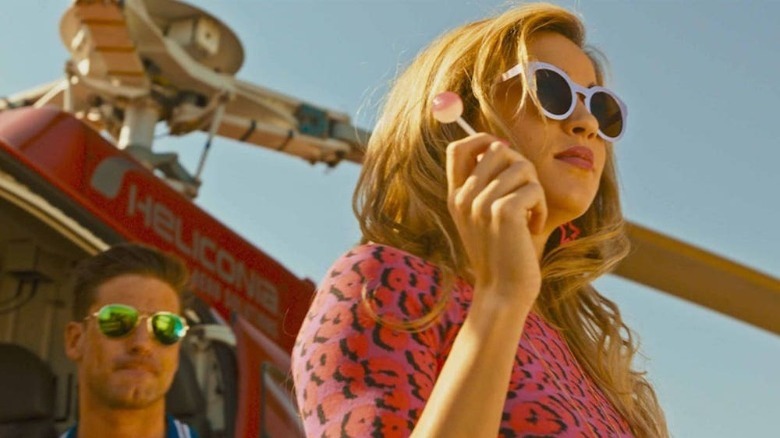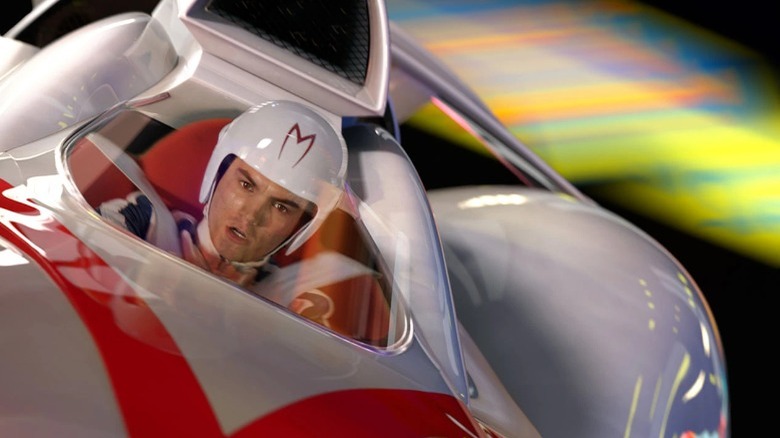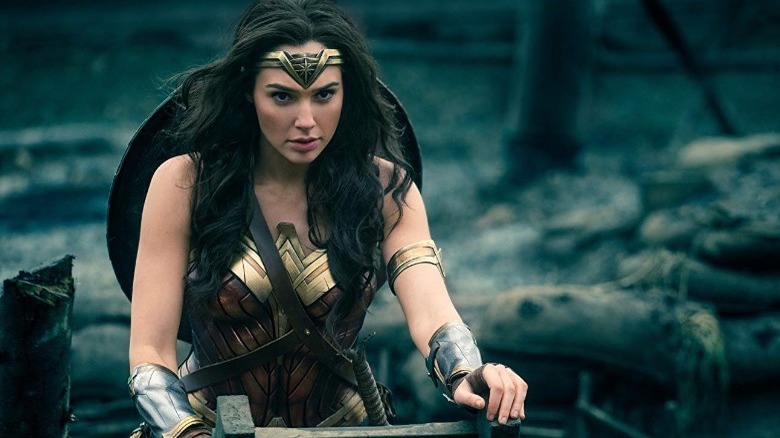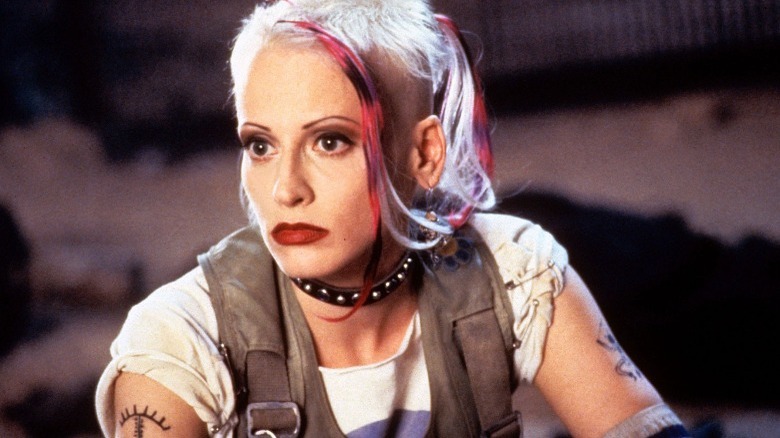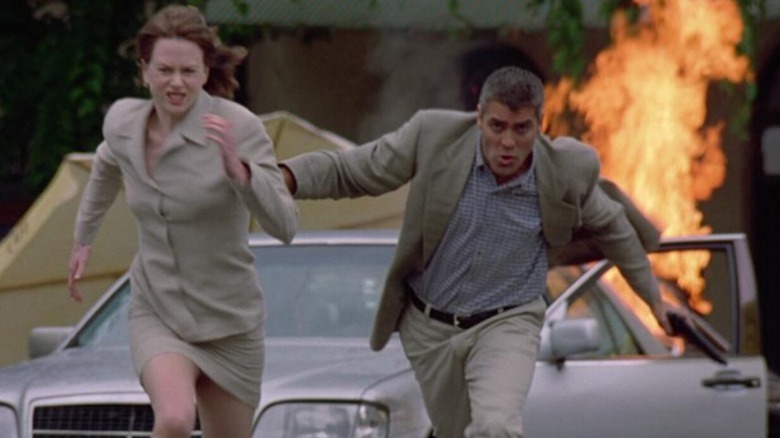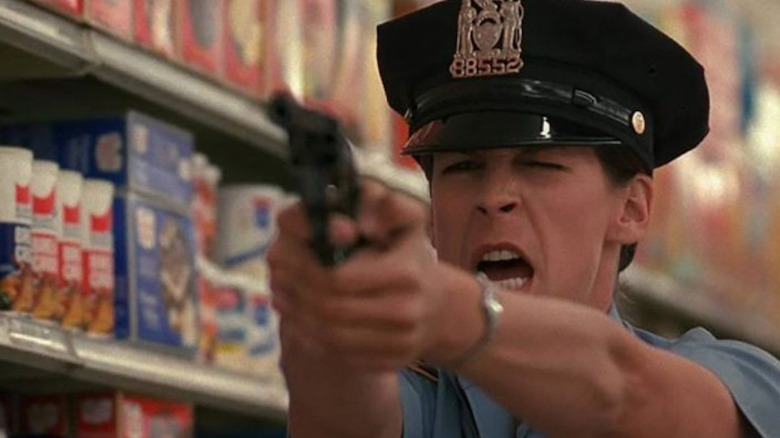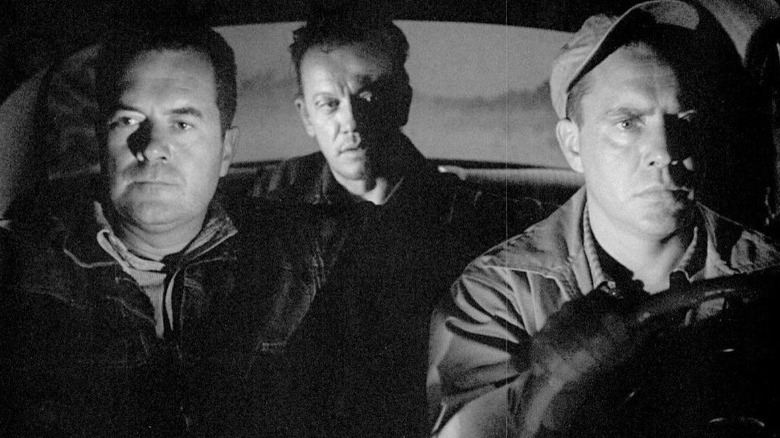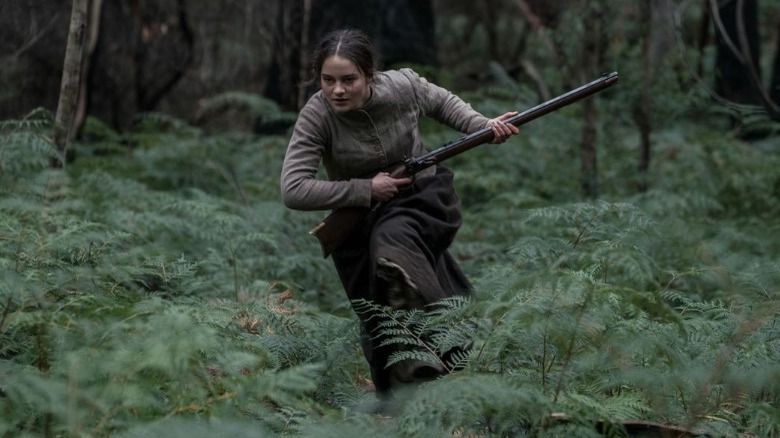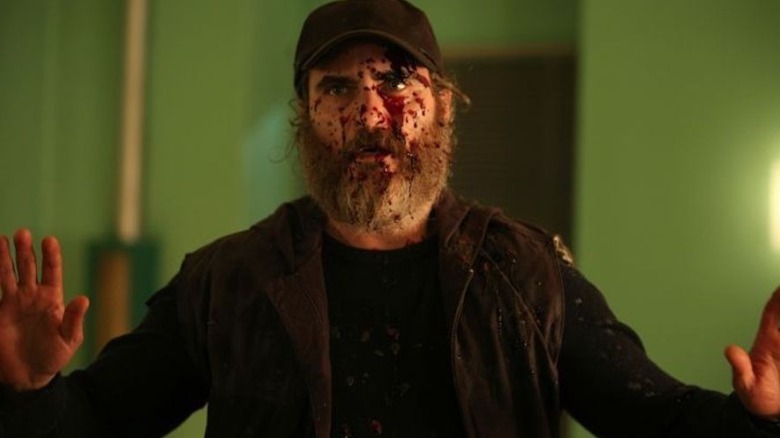The 15 Best Action Movies From Female Directors
There isn't a concrete definition of what makes an action movie. You simply know them when you see them. At their cores, action films tell stories about characters who face challenges that push their physical abilities, their dedication to a cause, and their capacities for violence. They're also very, very exciting. Often, our heroes need to overcome incredible odds to accomplish their goals, and an undeniable satisfaction comes from seeing them fulfill their destinies. Action also has the wonderful ability to bring audiences closer; there's nothing quite like being a member of the huddled masses, all enjoying spectacular chases, fights, and explosions together.
Action films have also been dominated by male directors for decades. While social conventions make it very difficult for women to land in the director's chair at all, the action genre feels especially impenetrable for female filmmakers. Thankfully, there have been occasional breakthroughs; figures like Kathryn Bigelow and Lana and Lili Wachowski consistently make original, thrilling movies that push the genre forward, even if it takes the rest of Hollywood a while to catch up.
We're here to champion the very finest female directors making action movies today. While some of our choices may be surprising, we believe that action movies come in all shapes and forms, and that every movie on this list is a great example of what action films represent — and, even more importantly, what they have the potential to become. These are, in our opinion, the 15 best action movies from female directors.
Suspense
Louis Weber was a pioneer. She was at the forefront of moviemaking from the very beginning, directing over 100 films and starring in many of them. In 1916, Weber was the single highest-paid studio director in America, regardless of gender, and with her 1913 film "Suspense," she helped to create the very foundations of the action genre. Despite only being 10 minutes in length, "Suspense" features many elements that are essential to modern filmmaking and the action genre. It also helped usher in effects like the split-screen (always one to outdo herself, Weber splits the screen three ways at once in "Suspense").
The film follows a simple story: A woman (Weber) must keep herself and her baby away from an invading tramp (Sam Kaufman) while her husband (Val Paul) races home to save her. There is plenty of virtuosic camera work in "Suspense," including a jaw-dropping shot from the perspective of a rear-view mirror, which is all the more impressive when you consider just how inflexible cameras used to be. This landmark movie even features one of the earliest car chases in cinema! "Suspense" is proof that films over a century old can still thrill.
The Hurt Locker
"The Hurt Locker" is probably best known as the film that toppled "Avatar" at the Academy Awards, winning best picture and enshrining Kathryn Bigelow as the first woman to ever win the best director Oscar. The film is one of the most deserving winners in Oscar history, delivering a masterclass in nerve-shredding intensity. It follows a bomb disposal unit in Iraq, focusing on the exploits of maverick Sergeant William James (Jeremy Renner). James is extremely gifted at what he does, but his unorthodox methods frequently put him at odds with his squadron. Renner is extraordinary as an adrenaline junkie addicted to the thrill of the chase, and co-star Anthony Mackie is equally outstanding as J.T. Sandborn, who just wants to see his family again.
Bigelow is a flawless director of action, and every bomb-diffusing set piece carries an exhilarating feel of risk. Marco Beltrami and Buck Sanders' paranoid score, combined with cinematographer Barry Ackroyd's chilling compositions, keep heart rates high, and Bigelow puts all the elements together with the skill of a master orchestrator. What "The Hurt Locker" does so brilliantly is replicate the feeling of what it must be like to be on the frontlines — its ability to create a thrilling adrenaline rush of terror is unmatched.
Birds of Prey
Superhero movies have dominated multiplexes over the last decade, with multiple large-scale blockbusters coming out each and every year. Despite their huge budgets, these movies are often shockingly sparse in color and creativity, bogged down by weirdly serious tones that ignore their glorious comic book roots. Director Cathy Yan's "Birds of Prey (and the Fantabulous Emancipation of One Harley Quinn)" bucks that trend with a wicked sense of humor, a sumptuous visual palette, and exciting and creative action that captures the wonder and excitement that American superhero comics are capable of.
It's anchored by an unhinged and energetic performance from Margot Robbie as Harley Quinn, an anti-heroine who loves two things: her ex-boyfriend, and beating the crap out of people. Yan's film has some spectacularly choreographed set pieces — the police station brawls and the movie's climax come to mind — that deliver cacophonies of violence that still manage to be easy to follow, which is quite a feat. "Birds of Prey" manages to feel not like a rehash, prequel, or sequel, but rather an entirely original experience.
Point Break
It's hard to shake the feeling that action movies are getting more and more serious these days. As such, Kathryn Bigelow's phenomenal "Point Break" is a stunning throwback to the good old days, when big movies were over the top and thoroughly ridiculous. The film follows FBI agent Johnny Utah (Keanu Reeves) as he tries to solve a string of bank robberies in California committed by a group of criminals who wear masks bearing the likenesses of former presidents. Fellow agent Angelo (Gary Busey) believes that the robberies are being committed by surfers, so Utah heads to the beach. That's where he meets the charismatic Bodhi (Patrick Swayze), and the two find themselves almost instantly drawn to one another.
Bigelow's film is big, brash, and really freaking fun. Both Reeves and Swayze are on top form, delivering scintillating physical performances. "Point Break" ingeniously and absurdly combines the glory of a sports film, the toughness of a crime movie, and the awesomeness of a great action flick, resulting in a dizzying, unforgettable blast. To top it all off, there's a genuinely incredible chase sequence and some mind-bogglingly cool stunts. "Point Break" is the first surf-cop movie — and, to date, the only one, with the exception of a totally unnecessary remake. Maybe, if we're lucky, Bigelow will bless us with a return to this sun-soaked world.
D.E.B.S.
There's a secret behind the SAT: Hidden in the standardized test is a second examination that tests the subject's aptitude for espionage. The top-performing women are recruited to D.E.B.S. (which stands for "discipline, energy, beauty, and strength"), a secret academy that trains recruits to become top-level agents. One member of the team, Amy (Sara Foster), is tasked with taking down a deadly villain, Lucy (Jordana Brewster), but they end up falling in love with each other instead.
"D.E.B.S." is corny, but it also packs plenty of surprises. Director Angela Robinson takes the film's cheesy Nickelodeon-like aesthetic and deliciously subverts it with a powerful story of queer acceptance. Further, while the action sequences are crisp and exciting, what really helps "D.E.B.S." stand out is its wicked and irreverent sense of humor. In one hysterical moment, Lucy is frustrated over relationship problems, and almost wipes out all of Australia because she doesn't like its attitude. The scene then transitions to a montage set to Erasure's "A Little Respect" which is nothing short of a giddy delight. "D.E.B.S." is a proudly queer action movie, something we need a whole lot more of.
The Matrix
Seeing "The Matrix" for the first time feels like a religious experience. It's so easy to get swept up in its epic scale and mind-bending story — I remember seeing it as a child like it happened yesterday. For the uninitiated, Lana and Lily Wachowski's sophomore feature follows Neo (Keanu Reeves), a man who is told something outrageous: The world that he believes is real is actually an elaborate virtual deception. If that sounds ridiculous, that's because it is, but it's magnificently handled by the Wachowskis, who make the absurd feel remarkably grounded.
"The Matrix" was, in every way, completely ahead of its time. The ingeniously choreographed action mixed with 360-degree turns and slow-motion gunfights have been copied so many times (never more effectively than in "Shrek," mind you) that, to the modern eye, it almost feels derivative. But "The Matrix" did it first, and at the time, it was groundbreaking. "The Matrix" was a massive box-office hit and won four Oscars, including best visual effects and best editing. It's one of those spectacles that make you feel like anything is possible, and rewatching it only yields more rewards.
Revenge
French filmmaker Coralie Fargeat announced herself as a director to watch with her feature debut "Revenge," a pulse-pounding story of a woman wronged. Jen (Matilda Anna Ingrid Lutz) is excited about a romantic rendezvous with her boyfriend, but after they fly to a beautiful remote property, their fun is interrupted by the arrival of unexpected guests. A dream vacation quickly turns into a horrifying nightmare for Jen, who's raped, beaten, and left for dead. A bold and visceral take on a well-established genre, the aptly named "Revenge" is a shockingly gory and empowering thriller, delivering a queasy cocktail of vivid, grotesque imagery and impactful bursts of color.
The rape-revenge genre is often rooted in misogyny that robs female protagonists of their agency. Thankfully, this is not the case in Fargeat's film, which feels both transgressive and transformative. In similar films, the father of the fallen woman is the one dishing out the revenge. Here, it's all carried out by the wrathful Jen. "Revenge" pulsates with ROB's synth score, and Fargeat (who also wrote and edited the film) shows incredible control of her craft for a first-time filmmaker.
Speed Racer
The Wachowskis constantly find themselves ahead of the curve, and there's no better example of the world not being ready for their challenging, forward-thinking films than 2008's "Speed Racer." Upon its release, the movie was critically derided. It also bombed at the box office, failing to earn back its $120 million budget. The world simply wasn't prepared for the pedal-to-the-metal madness encompassed in every single one of the film's 135 minutes.
An unheralded masterpiece, "Speed Racer" is an adaptation of the spectacularly weird '60s anime of the same name. It follows the titular Speed Racer (Emile Hirsch), an outstanding young talent who dominates the track. When he discovers mass corruption in the racing world, he enters the same cross-country race that claimed the life of his beloved brother to set things right. The film is overwhelming in the best way, overloading the eye with kaleidoscopic color and cartoony, emotive visual effects. "Speed Racer" offers the finest racing action you could ever hope to lay eyes on, and it matches it with a genuinely affecting story. You've never seen anything like this before, and you may never see anything like it again.
Wonder Woman
"Wonder Woman" is a joy to behold, following the origins of Diana Prince (Gal Gadot), better known as Wonder Woman. Gadot shines in her best performance to date, delivering a confident and powerful take on the classic superhero, and the movie has some great character dynamics; Gadot has particularly fiery chemistry with her co-star Chris Pine.
Jenkins may have been a surprising choice to direct "Wonder Woman," as her previous film, "Monster," is about as different from a superhero movie as you can get. Thankfully, Jenkins proved to be an excellent choice, and frames her action set pieces with impressive clarity. Her camera focuses on characters over spectacle; when big fights break out, our attention remains with Diana and company, resulting in a strong throughline that never muddles things. There are some seriously sweet moments too, like when Diana is launched into the top of a church tower to take out a sniper. The fights vary greatly in scale, ranging from one-on-one battles to epic fights in Themyscira and on the frontlines of World War I. Thankfully, every single one of them is awesome.
Tank Girl
Anarchic energy abounds in "Tank Girl," a movie that's best described as a spectacular freefall into chaos. The film takes place in a dystopic 2033, where a comet has devastated Earth, obliterating the world's water supplies. What's left is controlled by the dastardly mega-corporation Water+Power, leading Tank Girl (Lori Petty) on a mission to beat up the baddies and restore order. Rachel Talalay's film, working off a screenplay by Tedi Sarafian, explodes with an exuberance that today's comic book adaptations would do well to take note of.
While the film is fairly limited when it comes to the actual plot, it's impossible to predict what will happen next. At one moment, Tank Girl and Jet Girl (Naomi Watts) are saving a young girl from the clutches of prostitution. The next, there's a full-scale musical rendition of Cole Porter's 1928 classic "Let's Do It." Despite its post-apocalyptic setting, "Tank Girl" is bursting with color, a refreshing change from most films with a similar setting, which feature so much sand that they're practically monochromatic. Filled with glorious set pieces, impressive kills, and a slick sense of humor, "Tank Girl" is the kind of risky action film we desperately need more of.
The Peacemaker
Directed by Mimi Leder ("Deep Impact"), "The Peacemaker" is a thrilling and complex action movie that follows Dr. Julia Kelly (Nicole Kidman) and Lieutenant Colonel Thomas Devoe (George Clooney) as they go on a globetrotting mission to reclaim stolen nuclear weapons before the weapons can be used by terrorists.
"The Peacemaker" has many staples of glorious '90s action thrillers, including slow-motion explosions, car chases, and literal cliffhangers. What's impressive about Leder's film, though, is the way that it subtly deals with institutionalized sexism. In one moment, Kelly ensures that her team is "comfortable taking orders from a woman." In another, while dealing with an angry person on the phone, she retorts, "I'm the man in charge." "The Peacemaker" doesn't dive too heavily into the issue — it's too busy moving at a breakneck pace to veer away from the action — but they're important moments for the way they bolster Kidman's character.
What's also ahead of its time is the way that Clooney and Kidman's characters have a purely professional relationship; there's not even a whiff of romantic chemistry between them. Julia Kelly is every bit as capable as her male counterpart, and when the action gets going, Leder creates space for Kelly to be an action hero in her own right.
Blue Steel
Does any director, regardless of gender, understand action better than Kathryn Bigelow? You could make a case that every single one of her action movies deserves to be on this list. Bigelow's crime thriller "Blue Steel," made the year before "Point Break," stars Jamie Lee Curtis as rookie police officer Megan Turner. On her very first day as part of the NYPD, Turner shoots and kills a perpetrator who's wielding a gun during a supermarket robbery. Then, one of the civilians at the crime scene, commodities trader Eugene Hunt (Ron Silver, in an unrelentingly nasty performance), takes the man's gun unnoticed and uses it to go on a murder spree of his own. He also develops an unhealthy obsession with Turner, and the two engage in a tense game of cat-and-mouse as the bodies start piling up.
"Blue Steel" has a menacing villain in the parasitically creepy Eugene Hunt. He's a quintessential misogynist, the kind of guy who believes he deserves ownership of a woman. He avoids suspicion because of his powerful, high-paying job, but his arrogance threatens to undo him. Hunt is an effective metaphor for institutionalized sexism — so, who better than the ferociously charismatic Jamie Lee Curtis to take him down?
The Hitch-Hiker
Ida Lupino was a genuine trailblazer for female directors: When there were no opportunities available for her, Lupino and her husband founded their own production company. Lupino's "The Hitch-Hiker" is a high-octane thriller with a simple setup — so simple, in fact, that it could very well happen to you, as the movie's opening title card warns. Ray (Edmond O'Brien) and Gilbert (Frank Lovejoy) pick up a hitchhiker (William Talman) at night. The hitchhiker soon reveals himself to be Emmett Myers, a man making national headlines for being a blood-thirsty killer.
"The Hitch-Hiker" isn't your prototypical action movie, and there are none of the large-scale set pieces you may expect from the genre — nobody walks away in slow-motion from an explosion here. However, Lupino's film does capture the very essence of the genre: resourceful characters battling tremendous odds in life-threatening situations. Lupino distills that concept into a tight 71 minutes that will have you on the edge of your seat.
The movie is mostly set in the confines of a single car, with Lupino's camera favoring tense close-ups that effectively convey Ray and Gilbert's jangly nerves, as well as Emmett's menacing unpredictability. There's not a moment wasted in its brief runtime, and the overwhelming threat of violence culminates in a glorious final faceoff.
The Nightingale
Like "The Hitch-Hiker," Jennifer Kent's "The Nightingale" is pretty far from your typical action movie. Kent's uncompromising film is more of a thriller and a historical epic, but it certainly fulfills a key requirement of the action genre: "The Nightingale" follows our hero as she accomplishes physical feats and unleashes violence on her search for revenge. Aisling Franciosi is a revelation as Clare, a woman whose family is massacred by British officers in 1825 Tasmania, kicking off her quest to take down the men who destroyed her family. To assist her on her journey, Clare recruits Billy (Baykali Ganambarr), an indigenous tracker, and the two bond over their traumas.
Kent delivers one scene of shocking, unrelenting violence after the other, and "The Nightingale" is at its best when it explores Australia's blood-soaked colonialist history. Franciosi delivers a searing performance that simmers with relentless grief and anger. And yet, there's a surprising beauty underneath the horrors, and that's a big reason as to why "The Nightingale" is such a striking movie.
Viewers beware, however: "The Nightingale" is extremely tough viewing. I consider myself to have an iron stomach when it comes to cinema, but this movie made me wince on several occasions. It's not for the faint of heart, but those willing to take the chance will be rewarded with an unforgettable portrait of trauma and rage.
You Were Never Really Here
If you like your action movies with a heavy dose of art-house, look no further than Lynne Ramsay's stressful and disturbing "You Were Never Really Here." The film almost functions as a sort of what-if piece, exploring the after effects of an action film. Joe has lived through high-stakes action before (he's a war veteran), and carries the burden of past military service with him wherever he goes. Despite his heavy trauma (Joe regularly imagines his own death), he's in the business of tracking down missing girls, leading to long stretches of quiet punctuated by harsh, unflinching violence.
Few possess an innate understanding of the power of cinema's visual language better than Ramsay, who delivers a tour-de-force film comprised entirely of security camera footage. It's action cinema at its most pared down and bleak, yet it's also utterly enthralling as Joe moves from room to room, savagely slaughtering anyone in his way with nothing but a hammer. Ramsay's film is every bit a tale of crushing loneliness and mental anguish as it is a bold and inventive action-thriller.
